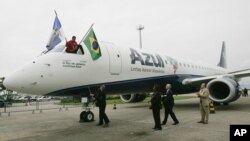SAO PAULO —
Brazilian domestic airline Azul Linhas Aereas pledged on Wednesday to cap the cost of traveling during the World Cup this year, adding to pressure on competitors who have been upbraided by the government for raising ticket prices.
None of the routes that Azul flies during the tournament will cost more than 999 reais ($420), said Azul founder David Neeleman, who started Brazil's third-biggest airline after stepping down as CEO of JetBlue in 2008.
The policy will cost Azul some 20 million reais in foregone revenue, Neeleman told journalists in Sao Paulo. He said the World Cup would also have a net negative impact on the carrier's bottom line due to a dropoff in business travel.
Civil aviation regulator ANAC welcomed Azul's move to cap fares and said it hoped other airlines would follow suit.
Azul's decision comes after officials threatened price controls on the country's hotels and airlines, including larger rivals Gol Linhas Aereas and TAM, the local unit of Chile's Latam Airlines Group.
Those rivals have been cutting routes, giving back aircraft and firing flight staff over the past two years in an attempt to restore profit despite high fuel prices and a tough exchange rate. The World Cup has loomed as a chance to restore their suffering profit margins.
But Brazil's aviation industry is under harsh scrutiny as one of the biggest potential embarrassments at the World Cup. A dozen host cities are scattered around the vast country, which will force some 600,000 foreigners and three million Brazilian fans through a series of overloaded airports during June and July.
U.S. fans alone will have to book at least 3,500 miles (5,600 km) in domestic flights between their team's first three matches in Brazil - to say nothing of the long international legs to get to the South American nation.
Azul flies only domestic routes with smaller aircraft such as the 118-seat E-195 made by Brazil's Embraer.
None of the routes that Azul flies during the tournament will cost more than 999 reais ($420), said Azul founder David Neeleman, who started Brazil's third-biggest airline after stepping down as CEO of JetBlue in 2008.
The policy will cost Azul some 20 million reais in foregone revenue, Neeleman told journalists in Sao Paulo. He said the World Cup would also have a net negative impact on the carrier's bottom line due to a dropoff in business travel.
Civil aviation regulator ANAC welcomed Azul's move to cap fares and said it hoped other airlines would follow suit.
Azul's decision comes after officials threatened price controls on the country's hotels and airlines, including larger rivals Gol Linhas Aereas and TAM, the local unit of Chile's Latam Airlines Group.
Those rivals have been cutting routes, giving back aircraft and firing flight staff over the past two years in an attempt to restore profit despite high fuel prices and a tough exchange rate. The World Cup has loomed as a chance to restore their suffering profit margins.
But Brazil's aviation industry is under harsh scrutiny as one of the biggest potential embarrassments at the World Cup. A dozen host cities are scattered around the vast country, which will force some 600,000 foreigners and three million Brazilian fans through a series of overloaded airports during June and July.
U.S. fans alone will have to book at least 3,500 miles (5,600 km) in domestic flights between their team's first three matches in Brazil - to say nothing of the long international legs to get to the South American nation.
Azul flies only domestic routes with smaller aircraft such as the 118-seat E-195 made by Brazil's Embraer.





